I'm working with the Code First feature of Entity Framework and I'm trying to figure out how I can specify the column data types that should be created when the database is auto-generated.
I have a simple model:
public class Article
{
public int ArticleID { get; set; }
public string Title { get; set; }
public string Author { get; set; }
public string Summary { get; set; }
public string SummaryHtml { get; set; }
public string Body { get; set; }
public string BodyHtml { get; set; }
public string Slug { get; set; }
public DateTime Published { get; set; }
public DateTime Updated { get; set; }
public virtual ICollection<Comment> Comments { get; set; }
}
When I run my application, a SQL CE 4.0 database is automatically created with the following schema:

So far, so good! However, the data I will be inserting into the Body and BodyHtml properties is routinely larger than the maximum allowed length for the NVarChar column type, so I want EF to generate Text columns for these properties.
However, I cannot seem to find a way to do this! After quite a bit of Googling and reading, I tried to specify the column type using DataAnnotations, from information found in this answer:
using System.ComponentModel.DataAnnotations;
...
[Column(TypeName = "Text")]
public string Body { get; set; }
This throws the following exception (when the database is deleted and the app is re-run):
Schema specified is not valid. Errors: (12,6) : error 0040: The Type text is not qualified with a namespace or alias. Only PrimitiveTypes can be used without qualification.
But I have no idea what namespace or alias I should be specifying, and I couldn't find anything that would tell me.
I also tried changing the annotation as per this reference:
using System.Data.Linq.Mapping;
...
[Column(DbType = "Text")]
public string Body { get; set; }
In this case a database is created, but the Body column is still an NVarChar(4000), so it seems that annotation is ignored.
Can anyone help? This seems like it should be a fairly common requirement, yet my searching has been fruitless!
